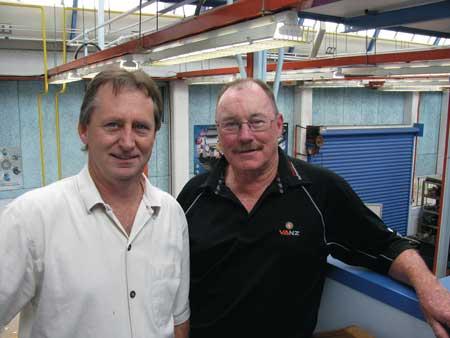| CLYDE Volpe, manager of the Vibration Institute of Australia, had a strong message for New Zealand industry recently whilst in the country conducting a vibration analysis workshop at the MIT Maintenance & Reliability Centre. Volpe, who has many years experience in the maintenance and reliability sector and a speaker at this year’s VANZ Conference, believes that many Kiwi companies used the excuse of the global financial crisis to cut back on maintenance expenditure – a typical knee-jerk, short-term thinking response that puts cost-cutting over availability, reliability, and, in certain cases, compromises safety. New Zealand companies have been going backwards on the maintenance and reliability front, believes Volpe. “Ten years ago, industry was more proactive, and there was a drive for reliability. But as times have got harder, there has been dis-investment. Now you’ve got one guy covering multiple facilities, and a lot more work is outsourced.” He says the danger of outsourcing maintenance and reliability work is that you lose ownership. Much of it needs to be brought in-house again. “Rio Tinto and BHP in Australia have done it – and they’ve now set up their own reliability departments and are showing huge rewards from this. “Company production management must invest in their own reliability departments, so plant and equipment availability is right up there.” Volpe also has a message for companies that think they’re addressing their reliability maintenance practices by conducting regular condition monitoring – it’s not going to work, he says. “Just simply conducting vibration analysis on a machine does not improve reliability, taking measurements on a machine does not increase its life” he says. “That’s wrong thinking. You could be measuring right up to the day the machine dies.” Management needs to consider the philosophy of a reliability department that focuses purely on reliability issues, says Volpe, and headed by somebody with reliability in front of their title. “Think of whom that person could be – perhaps a good fitter could be promoted to the position of reliability fitter? In much the same way as a reliability electrician looks at electrical entirely from a reliability aspect.” Reliability engineers need much more than a PC and calculator in their toolbox, adds Volpe. “They require tools such as vibration analysis, oil analysis, thermography, laser alignment, and so on. Remember, there’s really only one thing the maintenance department can give to production – and that’s reliability. “And, of course, reliability drives availability.” We have all seen the safety boards when entering a site, it is time we had a big Reliability board next to that sign to show and sell the Reliability Drive. Volpe will be back at the MIT Maintenance & Reliability Centre on August 2nd to reinforce this message at a ‘Condition Monitoring for Management’ seminar. Senior lecturer Larry Wiechern says this seminar is targeted directly at managers to give them the bigger picture on condition monitoring, and how to use it to drive reliability. Subjects covered include benchmarking, fault analysis and building a successful condition monitoring programme. Meanwhile, Volpe’s message is for companies to lift their overall equipment effectiveness (OEE) by increasing, rather than reducing maintenance expenditure – and stick to the basics. “Keep it simple. Get lubrication right, for example, which can be the biggest killer of bearings. “We’ve got to convince production managers that, in order to raise productivity, they have no choice but to spend more on reliability.”Contact: larry.wiechern@manukau.ac.nz |
Clyde Volpe, (left) with MIT's Larry Wiechern |






